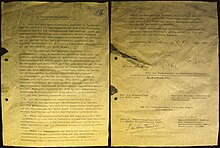surrender

A surrender is a declaration of submission, in common parlance a "final bowing to superior force". In international law in order to be agreements between military commanders called in which one party submits the opposing conditions unilaterally imposed. The loser in a conflict can demand certain concessions for the laying down of arms.
More accurate determinations to surrender are in the Hague Convention held in 1907, there (in particular the transfer of individual soldiers or smaller combat units as a unilateral act engl. Simple surrender ), whereby this to POW be.
The meaning of the term is narrowed in modern German to the affection of an inferior military conflict party. Originally, a surrender in more general usage denoted an agreement in the form of chapters, mostly of public importance.
to form
The conclusion of a war legal surrender (Engl. Capitulation, surrender ) is initiated by a surrender request by using proxies appointed envoys of the winning party or a capitulation by appropriate truce the losing party. However, other ways of transmitting information such as leaflets , radio or loudspeakers are also used. The conclusion does not require any special form and does not require the participation of governments or parliaments, for example in the form of ratification .
When it comes to surrender, one differentiates between one
- ( conditional or honorable ) surrender, in which the loser names conditions on which the cessation of fighting depends; mostly these are the protection of freedom ("free withdrawal") or at least the life of the underdog - "free withdrawal" or "treatment as regular prisoners of war " (ancient: they are given pardon ). In contrast to the armistice , the victorious party will mostly disarm the opponent in order to prevent attacks in the event of a change of heart. A ceasefire can also be unilaterally terminated at any time (Art. 36 HLKO ), whereas a surrender cannot be terminated .
Until the time of the Franco-Prussian War there was free withdrawal with weapons and military honors . The surrendering force was allowed to leave the scene in a closed formation with flying flags , with full armament, with their private property, with a sounding game (i.e. with a military band making music) and a burning fuse . Often every withdrawing soldier had to undertake not to fight the other signer of the surrender for a certain period of time, usually a year or for the duration of the campaign. Since personal honor still played an important role in civil society at that time - especially for noble officers - it represented a sure way of putting an opponent out of action without having to deal with too many prisoners of war. -
unconditional surrender , in which, in addition to military surrender, state-political surrender is also carried out. The authority over all military facilities passes to the enemy. But it is always the military who surrender. The term unconditional surrender was first used in the American Civil War of 1861/65. The armies of the southern states had to surrender individually (Lee, Johnston , ...). The southern states ceasedto existas an independent state-political entity and came under the rule of the Union ( USA ) again.
During World War II , the term unconditional surrender wasfirst used by the Allies against Germany and Japan at the 1943 Casablanca Conference . This ruled out the possibility of a ceasefire with another political leadership. The enemy was to be disarmed, the country occupied and an Allied military government installed.
Examples
Stalingrad
A conditional surrender, also known as an honorable surrender , was offered to the German 6th Army by the Soviet Colonel General Rokossowski on January 8, 1943 in Stalingrad during the Eastern campaign in World War II :
“We guarantee all officers, non-commissioned officers and men who give up the resistance life and security as well as return to Germany at the end of the war or to any other country at the request of the prisoners of war.
All Wehrmacht members of the surrendering troops keep their uniform, their insignia and medals, personal effects and valuables. The senior officers are left with sword and service weapon.
The officers, non-commissioned officers and men who give themselves up are immediately given normal food. Medical help is given to all wounded, sick and frost-damaged. We await your written answer on January 9, 1943 at 3:00 p.m. Moscow time by a representative personally authorized by you, who has to drive on the road from the Konnij passing point to the Kotluban station in a passenger car marked with a white flag. Your representative will be expected on January 9, 1943 at 3:00 p.m. by authorized Russian officers in Rayon> 8 <, 0.5 km southeast of passing point 564.
Should our call to surrender be rejected by them, we will announce that the troops of the Red Army and the Red Air Force will be forced to proceed to destroy the encircled German troops. You are responsible for their destruction. "
After this offer was initially rejected by the Germans, the remaining troops had to give up the fight on January 31, without being able to name any conditions. Of 107,800 German soldiers, only 6,000 returned from captivity.
Western front
The August 1, 1944 Wehrmacht Commander of Greater Paris appointed General of Artillery Dietrich von Choltitz took in light of the expected attack of the allied troops in Paris through the mediation of the Swedish Consul General in Paris Raoul Nordling contact with the French Resistence and delayed the execution of his Hitler issued the destruction order through military parades and threats until he handed the city over to Major General Leclerc as a representative of the regular French armed forces after his capture on August 25, 1944 .
In 1944, Major General Botho Henning Elster (1894–1952) commanded the largest surrender on the Western Front : after long agonizing marches north with numerous retreats , Elster formally surrendered on September 16, 1944 with 18,850 soldiers and 754 officers on the Loire Bridge at Beaugency US General Robert C. Macon of the 83rd Infantry Division . For this, he was sentenced to death on March 7, 1945 in absentia by the 1st Senate of the Reich Court Martial for “dangerous and misunderstood humanity” (details here ).
South front
Major General Günther Meinhold , who was transferred to Genoa / Italy as fortress commander on March 16, 1944, negotiated with the Italian partisan representatives of the CLN in April 1945, initially under the mediation of a medical professor and his German wife, for an undisturbed withdrawal of his troops from Genoa against the assurance that the execution would be carried out to prevent the ordered destruction of the port and industrial facilities, and surrendered to the partisan representatives on April 25, 1945 after the withdrawal order was not given, before the Allied troops reached the liberated city two days later.
Surrender of individual associations
The white flag has been officially included in the Hague Land Warfare Regulations since 1907 as a parliamentary's mark. The Land Warfare Regulations stipulate that warring parties must behave “chivalrously”. Since there were still siege wars around 1900, a symbol was chosen that can be easily recognized from a distance, even with the worst noise and powder smoke. The color white, as a symbol of purity and innocence, certainly has a Christian background. The white flag is still valid today for soldiers and civilians as an invitation to stop the fire.
Other meanings of the term
contract
Surrender (from Latin capitulare "to divide into chapters") originally referred to a contract or a written agreement in the general sense.
In the military sense it was
- the contract of a Landsknechts or merc with the advertisers to serve as a soldier ;
- the contract of a colonel with the sovereign or imperial circle for appointment as regimental owner ;
- the obligation of soldiers for a voluntarily extended period of service ( capitulators in the armies of the German Empire ).
- a treaty between two sovereign states (e.g. before 1848 between a Swiss canton and France ) on the provision of soldiers to be recruited in the national territory of one for the armed forces of the other (see soldier trade below).
Specifically, the term was used in the following cases:
- As electoral capitulation a written contract was called since the Middle Ages, in which a candidate's election committee made commitments in the event of his choice.
- for the treaties between the Ottoman Empire and European states in the 18th and 19th centuries. In them the European states agreed with the high porte u. a. extensive economic freedoms (see also capitulations of the Ottoman Empire ).
- for subsidy contracts when renting or selling soldiers.
Colloquial language
In colloquial usage, the term “surrender” is also used when one side is defeated and has to accept the terms of the armistice dictated by the opponent. However, the occupation and disarmament necessary for surrender is lacking here. An example would be the Compiègne armistice in 1918 . The German Empire was indeed defeated militarily, but not willing to put his fate in the hands of strangers.
Even if someone has a project or an opinion, for example, lack of support or due to strong counter-arguments must give up the idea of surrender is also used: " As I must surrender!"
Individual evidence
- ↑ Ekkehard Bauer: Capitulation , in: Karl Strupp / Hans-Jürgen Schlochauer (Ed.): Dictionary des Völkerrechts , Vol. II, 2nd edition, Berlin 1961, p. 192 ff., Quoted on p. 192.
- ^ Bauer, in: Strupp / Schlochauer (ed.), Dictionary des Völkerrechts , Vol. II, 2nd edition, Berlin 1961, p. 193.
- ↑ Bauer, in: Strupp / Schlochauer (ed.), Dictionary des Völkerrechts , Vol. II, 2nd edition, Berlin 1961, p. 193 f.
- ↑ S. instead of all Bauer, in: Strupp / Schlochauer (ed.), Dictionary des Völkerrechts , Vol. II, 2nd edition, Berlin 1961, p. 193.
- ↑ NN: Karl did not arrive . In: Der Spiegel . 2nd September 1962.
- ↑ Details z. B. in: Welf Botho Elster (his son), The Limits of Obedience. The life of Major General Botho Henning Elster in letters and contemporary testimonies , 2005, ISBN 978-3-48708-457-2 .
- ^ Günther Meinhold: Report on the deployment in Genoa 1944/45 and the surrender on April 25, 1945 . Federal Archives / Military Archives (BAMA) Freiburg under R 52 IV 89.
literature
- Holger Afflerbach : The Art of Defeat. A story of surrender . CH Beck, Munich 2013, ISBN 978-3-406-64538-9 .

